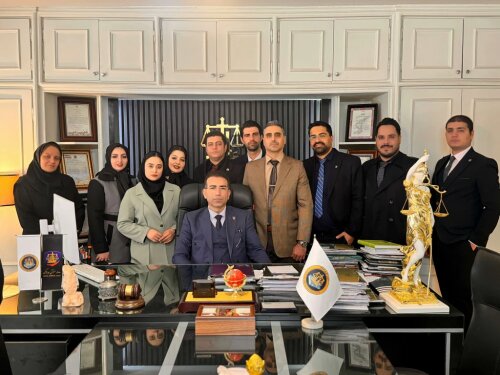Best Sanctions & Export Controls Lawyers in Mashhad
Share your needs with us, get contacted by law firms.
Free. Takes 2 min.
List of the best lawyers in Mashhad, Iran
About Sanctions & Export Controls Law in Mashhad, Iran
Sanctions and export controls law in Mashhad, Iran refers to the legal framework that governs the importation and exportation of goods, services, technology, and financial assets across national borders. Due to ongoing international sanctions, particularly those imposed by the United States, the European Union, United Nations, and other entities, Iran faces significant restrictions on various transactions with foreign countries. These laws are designed to ensure national security, protect economic interests, and comply with both domestic and international obligations. In Mashhad, one of Iran’s main commercial cities, sanctions and export controls are especially relevant for businesses, traders, logistics providers, and individuals involved in cross-border dealings.
Why You May Need a Lawyer
Seeking legal advice on sanctions and export control matters can be critical if you are:
- Managing a business engaged in international trade, import, or export
- Encountering blocked payments or frozen accounts due to sanctions
- Accused of violating export control rules or facilitating prohibited transactions
- Attempting to secure licenses for the export of specific goods or technologies
- Facing investigations from local authorities or international regulators
- Dealing with foreign partners concerned about secondary sanctions
- Unsure about the classification or legality of goods and services for export
- Seeking to navigate the complex web of Iranian and foreign legal requirements
A qualified lawyer can help you interpret regulations, secure permits, defend against allegations, and reduce risks of legal liabilities.
Local Laws Overview
In Mashhad, sanctions and export controls are guided by a variety of local and national regulations. The Iranian government, through the Ministry of Industry, Mines and Trade along with the Central Bank of Iran, enforces strict rules on the movement of goods, dual-use items, sensitive technologies, and financial transactions. Restrictions may apply to:
- Exporting goods and technology with potential military or strategic uses
- Collaborating with entities or individuals on international sanction lists
- Engaging in transactions using foreign currencies restricted by the government
- Import or export of pharmaceuticals, aircraft parts, or telecommunications equipment, often contingent on obtaining special permits
- Reporting and compliance requirements for businesses involved in foreign trade
Violations can lead to severe penalties, including fines, confiscation of goods, suspension of business licenses, and criminal prosecution. Regional customs offices in Mashhad and national agencies closely oversee adherence to these rules.
Frequently Asked Questions
What are sanctions and export controls?
Sanctions are legal measures that restrict or prohibit transactions with specific countries, entities, or individuals, typically for political or security reasons. Export controls are laws that limit the movement of certain goods, technologies, or information across borders to protect national interests.
Who imposes sanctions affecting Mashhad, Iran?
Sanctions that affect Mashhad are often imposed by organizations like the United Nations, the United States, the European Union, and individual countries. Iran also implements its own domestic controls and retaliatory measures.
How do sanctions impact businesses in Mashhad?
Sanctions can block access to certain goods, technologies, and financial systems, making it difficult to conduct international trade, receive payments, or collaborate with foreign partners.
Are all imports and exports subject to controls?
Not all products are restricted, but specific categories such as military equipment, dual-use items, advanced technologies, and certain pharmaceuticals are tightly regulated.
What are the penalties for violating export controls?
Penalties can include fines, confiscation of goods, suspension of licenses, and even imprisonment, depending on the severity of the violation.
Can individuals face sanctions for personal transactions?
Yes, individuals can be subject to sanctions if they are found to be engaging in prohibited transactions, transferring restricted items, or working with sanctioned parties.
Is it possible to obtain a license for restricted exports?
In some cases, the Iranian government allows for special licenses or exemptions. The process requires submitting detailed applications and supporting documentation to relevant authorities.
How can a lawyer assist with sanctions compliance?
A lawyer can help you understand the laws, guide you through regulatory processes, draft compliance programs, and represent you in administrative or judicial proceedings.
What government agencies oversee export controls in Mashhad?
Key agencies include the Ministry of Industry, Mines and Trade, Iranian Customs Administration, and the Central Bank of Iran. They work together to enforce compliance and issue permits.
Should foreign companies operating in Mashhad be concerned about secondary sanctions?
Yes, foreign companies must consider the risk of secondary sanctions, especially when dealing with US-sanctioned entities or sectors, as this can impact their global operations and access to international financial systems.
Additional Resources
For further information or assistance, you may contact the following:
- Ministry of Industry, Mines and Trade - Responsible for issuing export-import licenses and providing regulatory guidance
- Iranian Customs Administration - Oversight on the movement of goods in and out of the country
- Central Bank of Iran - Handles regulations related to financial transactions under sanctions
- Mashhad Chamber of Commerce, Industries, Mines and Agriculture - Provides educational resources and business advisory services
- Certified legal practitioners specializing in export control and sanctions matters
Next Steps
If you require legal assistance concerning sanctions or export controls in Mashhad, consider the following steps:
- Gather all relevant documentation related to your transactions or business operations
- Identify and reach out to a local lawyer with expertise in sanctions and export control law
- Prepare a clear summary of your situation and specifics of your legal needs
- Consult with the relevant governmental agencies as advised by your legal counsel
- Stay updated on regulatory changes that could impact your activities
Consulting with an experienced legal professional is the best way to ensure compliance, navigate complex regulations, and protect your interests in matters related to sanctions and export controls in Mashhad, Iran.
Lawzana helps you find the best lawyers and law firms in Mashhad through a curated and pre-screened list of qualified legal professionals. Our platform offers rankings and detailed profiles of attorneys and law firms, allowing you to compare based on practice areas, including Sanctions & Export Controls, experience, and client feedback.
Each profile includes a description of the firm's areas of practice, client reviews, team members and partners, year of establishment, spoken languages, office locations, contact information, social media presence, and any published articles or resources. Most firms on our platform speak English and are experienced in both local and international legal matters.
Get a quote from top-rated law firms in Mashhad, Iran — quickly, securely, and without unnecessary hassle.
Disclaimer:
The information provided on this page is for general informational purposes only and does not constitute legal advice. While we strive to ensure the accuracy and relevance of the content, legal information may change over time, and interpretations of the law can vary. You should always consult with a qualified legal professional for advice specific to your situation.
We disclaim all liability for actions taken or not taken based on the content of this page. If you believe any information is incorrect or outdated, please contact us, and we will review and update it where appropriate.










